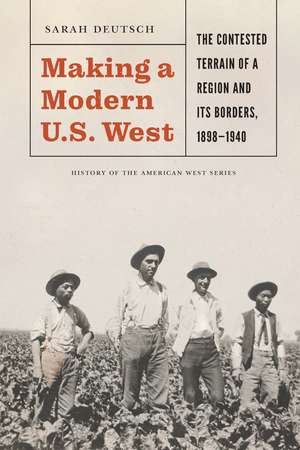Making a Modern U.S. West: The Contested Terrain of a Region and Its Borders, 1898-1940: History of the American West
Autor Sarah Deutsch Prefață de Richard W. Etulainen Limba Engleză Hardback – 2022
In Making a Modern U.S. West Sarah Deutsch surveys the history of the U.S. West from 1898 to 1940. Centering what is often relegated to the margins in histories of the region—the flows of people, capital, and ideas across borders—Deutsch attends to the region’s role in constructing U.S. racial formations and argues that the West as a region was as important as the South in constructing the United States as a “white man’s country.” While this racial formation was linked to claims of modernity and progress by powerful players, Deutsch shows that visions of what constituted modernity were deeply contested by others. This expansive volume presents the most thorough examination to date of the American West from the late 1890s to the eve of World War II.
Preț: 383.50 lei
Nou
Puncte Express: 575
Preț estimativ în valută:
73.38€ • 76.82$ • 60.72£
73.38€ • 76.82$ • 60.72£
Carte disponibilă
Livrare economică 17-31 martie
Preluare comenzi: 021 569.72.76
Specificații
ISBN-13: 9781496228611
ISBN-10: 1496228618
Pagini: 656
Ilustrații: index
Dimensiuni: 152 x 229 x 55 mm
Greutate: 1.09 kg
Editura: Nebraska
Colecția University of Nebraska Press
Seria History of the American West
Locul publicării:United States
ISBN-10: 1496228618
Pagini: 656
Ilustrații: index
Dimensiuni: 152 x 229 x 55 mm
Greutate: 1.09 kg
Editura: Nebraska
Colecția University of Nebraska Press
Seria History of the American West
Locul publicării:United States
Notă biografică
Sarah Deutsch is a professor of history at Duke University. She is the author of Women and the City: Gender, Space, and Power in Boston, 1870–1940 and No Separate Refuge: Culture, Class, and Gender on an Anglo-Hispanic Frontier in the American Southwest, 1880–1940.
Cuprins
Series Editor’s Introduction
Acknowledgments
Introduction: How to Make the West Modern
Part 1. Demarcating, 1898–1910
1. Man and Nature
2. The Changing Meaning of Crossing Lines
3. Being American in Boley, Oklahoma
Part 2. Agitating, 1910–21
4. Revolution and Revolutionaries
5. Women and Their Alliances
6. Global Conflict and Local Strife
Part 3. Speculating, 1920–29
7. Oil
8. Land
9. Speculating on the West Imagined
Part 4. Mobilizing, 1928–40
10. Demobilizing
11. Mobilizing the New Deal
12. Moving People and Animals to Save the People and the Land
Conclusion: Making a Modern West
Notes
Bibliography
Index
Acknowledgments
Introduction: How to Make the West Modern
Part 1. Demarcating, 1898–1910
1. Man and Nature
2. The Changing Meaning of Crossing Lines
3. Being American in Boley, Oklahoma
Part 2. Agitating, 1910–21
4. Revolution and Revolutionaries
5. Women and Their Alliances
6. Global Conflict and Local Strife
Part 3. Speculating, 1920–29
7. Oil
8. Land
9. Speculating on the West Imagined
Part 4. Mobilizing, 1928–40
10. Demobilizing
11. Mobilizing the New Deal
12. Moving People and Animals to Save the People and the Land
Conclusion: Making a Modern West
Notes
Bibliography
Index
Recenzii
"Deutsch has done something special by producing a mosaic history of the American West from 1898–1940. . . . Situated between Elliott West's Continental Reckoning and John Findlay's The Mobilized American West, Deutsch's book is the vital bridge in what are the most comprehensive histories of the West published to date."—Anthony W. Wood, Montana The Magazine of Western History
"Sarah Deutsch has written possibly the most important survey of modern U.S. western history in a couple of decades."—Alicia M. Dewey, Southwestern Historical Quarterly
"Deutsch's Making a Modern West is destined to be a major reference work and deserves a wide readership among scholars and others interested in this region."—William C. Pratt, Nebraska History
"In another masterful installment in a masterful series, Deutsch has successfully argued that the West's history changed the nation's."—Flannery Burke, Journal of Arizona History
"Deutsch's work is of great importance to students of the American West and in fields such as labor, race relations, gender, and economic history."—J. M. Starling, Choice
"This book offers a major revision of Western history that takes place well into the 20th Century. It should be required reading that will surprise anyone enamored of a mythic West."—Abraham Hoffman, Roundup Magazine
"Carefully avoiding monolithic generalizations of the West, Deutsch's attention to diverse peoples proclaims that competing visions for Western modernity were not just between insiders and outsiders, but ubiquitous within. . . . [Making a Modern U.S. West] provides a strong framework for other historians working in the era and region to build upon."—Brenden W. Rensink, Annals of Wyoming
"Sarah Deutsch's mammoth new tome on the United States West in the early twentieth century brings a fresh interpretive lens to these decades and draws new connections between familiar events."—Sheila McManus, Histoire Sociale
“Authoritative and empathetic, Sarah Deutsch limns an exclusionary modern West created for white men by white men. In her clear-eyed revision, that West still offered room to challenge division—strong and resourceful women and activists demanding a different, democratic West.”—Anne Hyde, author of Empires, Nations, and Families: A History of the North American West, 1800–1860, a Pulitzer Prize finalist
“Epic and breathtaking in scope, Making a Modern U.S. West captures the volatile struggles over land, rights, and democracy. Deutsch vividly reveals how Native peoples and ordinary migrants from around the globe fought for their opportunities and for their aspirations in a world riven by the federal government’s tipping the scales in labor wars, speculative capitalism, and racial exclusion.”—Nayan Shah, author of Stranger Intimacy: Contesting Race, Sexuality, and the Law in the North American West
Descriere
Making a Modern U.S. West surveys the history of the U.S. West from 1898 to 1940, centering what is often relegated to the margins in histories of the region—the flows of people, capital, and ideas across borders.




